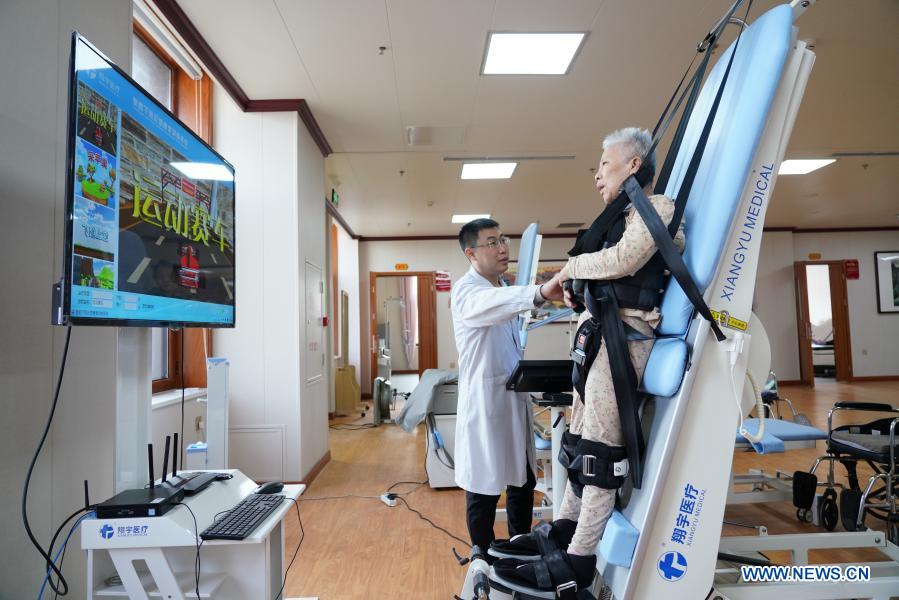Chinese residents generally have good health behaviors: report
China's urban residents have in general maintained good health habits, with 78 percent of cities in China rated as within the mid-range and above regarding their health behaviors, as revealed in a report jointly issued by the Institute for China Sustainable Urbanization (ICSU) and the Vanke School of Public Health at Tsinghua University.

An elderly man undertakes rehabilitation training at the Tangshan Anxin Medical Pension Manor in Guye District of Tangshan City in north China's Hebei Province, March 24, 2021. (Xinhua/Mu Yu)
The report, based on 2019 data, evaluated health behaviors in 80 major cities throughout China, covering 27 provinces and 550 million people, said Li Dong, a senior researcher with the ICSU.
It collected and analyzed around 1 billion items of information generated from wearable devices, 5 billion sets of health consumption data, as well as usage habits for mobile applications among 200 million users, he added.
Hangzhou, capital of east China's Zhejiang province ranked first in the country in terms of its residents' health behaviors, followed behind by Shanghai, also in east China, and Shenzhen, in south China's Guangdong province.
High-ranking cities are mainly distributed along coastal areas in the eastern part of the country, as well as within the Yangtze River economic belt, which thus indicates relatively large regional disparities.
The report pointed out that some indexes, including health literacy and the frequency of regular physical exercise, still need to be improved before they can meet the targets set in the Healthy China Action Plan (2019-2030), a guideline issued by the State Council, China's cabinet, two years ago.
Obesity rates in northern cities are higher than rates in the south, the report said. Six to eight percent of the residents in northeast and north China are obese. The report attributed this higher rate to the specific dietary habits in these regions – with a high intake of wheaten foods and meat products.
The report also warned residents in southern cities about poor sleep quality. For instance, over 12 percent of residents in Haikou and Sanya, south China's Hainan province, as well as in Nanning, capital of south China's Guangxi Zhuang autonomous region, sleep less than six hours three days a week.
Residents in top-tier Chinese cities are investing more in their health, including Shenzhen, Hangzhou, Guangzhou, Nanjing and Shanghai, according to the report, which explains that residents' health expenditure is closely linked with economic development.
Per capita medical consumption varies regionally, the report said. It stands at 2,700 yuan ($418) in Beijing, while in Xining, west China's Qinghai province, the figure is less than 500 yuan.
Commercial health insurance covers 21 percent of residents living in key cities on average, and the coverage rate is higher in the east than in the central and western parts of the country, the report said.
Health behaviors are affected by multiple factors and need to be optimized sustainably and systematically, Li said. The report calls for joint efforts among local governments, communities, enterprises and individuals to meet people's increasing demand for personal health, he added.
Photos
Related Stories
- China to build major TCM center for epidemic prevention, treatment
- Sleep vital to associating emotion with memory: study
- Hydatid disease effectively contained thanks to thorough screening, free treatment in Tibet
- One in five Chinese suffer from high blood pressure
- Weekly snapshot of Chinese health news
- Over 50 pct Chinese adults overweight or obese: report
- China to improve cancer screening: expert
- Depression prevalence rate in China reaches 2.1 pct
- Warning labels help reduce sugary drink intake among college students
- China's health authorities urge universal health code recognition
Copyright © 2021 People's Daily Online. All Rights Reserved.










